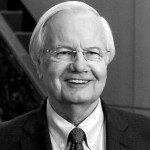
Hillary Clinton’s official campaign launch in New York, NY on June 13, 2015. (Photo Credit: Brit Liggett for Hillary for America)
“Perfect! Perfect!” exclaimed a woman looking around at the Four Freedoms Park on New York City’s Roosevelt Island as a large crowd waited for Hillary Clinton to announce her presidential candidacy last weekend.
And so it was. Secretary Clinton had chosen an ideal setting to link her destiny to the founding father of the modern Democratic Party, Franklin Delano Roosevelt, the political giant whose famous proclamation in 1941 of the Four Freedoms – freedom of speech and worship, freedom from fear and want — defined the essence of American ideals after a devastating economic disaster and as we prepared to enter a great world war.
![Hillary Clinton’s official campaign launch in New York City on June 13, 2015, with downtown Manhattan in the distance. (Photo Credit: Brit Liggett for Hillary for America) [click to enlarge]](https://billmoyers.com/wp-content/uploads/2015/06/HIllary-launch-campaign-downtown-another-view-300x169.jpg)
Hillary Clinton’s official campaign launch in New York City on June 13, 2015, with downtown Manhattan in the distance. (Photo Credit: Brit Liggett for Hillary for America) [click to enlarge]
As Clinton spoke — “Prosperity can’t be just for CEOs and hedge fund managers” and “Democracy can’t be just for billionaires and corporations” — you could imagine the juxtaposition to have been deliberate, staged by her managers to superimpose her rhetorical defiance of plutocracy against its glass and steel castles off in the distance. No doubt she had thrown around herself this cloak of populism because it is the current fashion – a superb and timely one – among many Democrats, especially progressives battling the oxymoronic Wall Street Democrats who in the past thirty years hijacked FDR’s party and severed it from its working class roots.
So it was refreshing to see her sally forth to do battle with the hyenas of Wall Street (as one noted hedge fund manager candidly described his ilk) proclaiming that, “The financial industry and many multinational corporations have created huge wealth for a few by focusing too much on short-term profit and too little on long-term value, too much on complex trading schemes and stock buybacks, too little on investments in new businesses, jobs, and fair compensation.”
Yet you could also wonder if they had been unaware of another possible reading of the metaphor presented by the sight of Roosevelt Island against the skyline of Wall Street — something her handlers didn’t intend: a mockery of the words she was speaking at that very minute.
She is, after all, a favorite of the giant banks, the CEOs and hedge funds she now was castigating. Between 2009 and 2014, Clinton’s list of top 20 donors starts out with Citigroup and includes JPMorgan Chase, Morgan Stanley and Goldman Sachs, whose chief Lloyd Blankfein has invested in Clinton’s son-in-law’s boutique hedge fund. These donors are, as the website Truthout’s William Rivers Pitt notes, “the ones who gamed the system by buying politicians like her and then proceeded to burn the economy down to dust and ash while making a financial killing in the process.”
They’re also among the deep-pocket outfits that paid for speeches and appearances by Hillary or Bill Clinton to the tune of more than $125 million since they left the White House in 2001. It could hardly escape some in that crowd on Roosevelt Island, catching a glimpse of the towers of power and might across the river: Can we really expect someone so deeply tethered to the financial and business class – who moves so often and so easily among its swells – to fight hard to check their predatory appetites, dismantle their control of Congress, and stand up for the working people who are their prey?
Consider the two Canadian banks with financial ties to the Keystone XL pipeline that fully or partially paid for eight speeches by Hillary Clinton. Or her $3.2 million in lecture fees from the tech sector. Or the more than $2.5 million in paid speeches for companies and groups lobbying for fast-track trade. According to TIME magazine and the Center for Responsive Politics, in 2014, “Almost half of the money from Hillary Clinton’s speaking engagements came from corporations and advocacy groups that were lobbying Congress at the same time… In all, the corporations and trade groups that Clinton spoke to in 2014 spent $72.5 million lobbying Congress that same year.”
Then look at David Sirota’s recent reporting for the International Business Times, especially the revelation that while Hillary Clinton was Secretary of State, her department “approved $165 billion worth of commercial arms sales to 20 nations whose governments have given money to the Clinton Foundation, according to an IBTimes analysis of State Department and foundation data… nearly double the value of American arms sales made to the those countries and approved by the State Department during the same period of President George W. Bush’s second term.”
Those nations include Saudi Arabia, Kuwait, Algeria, the United Arab Emirates, Oman and Qatar, each of which “gained State Department clearance to buy caches of American-made weapons even as the department singled them out for a range of alleged ills, from corruption to restrictions on civil liberties to violent crackdowns against political opponents.”
Further, American defense contractors like Boeing and Lockheed who sold those arms and their delivery systems also shelled out heavily to the $2 billion Clinton Foundation and the Clinton family. According to Sirota, “In all, governments and corporations involved in the arms deals approved by Clinton’s State Department have delivered between $54 million and $141 million to the Clinton Foundation as well as hundreds of thousands of dollars in payments to the Clinton family, according to foundation and State Department records. The Clinton Foundation publishes only a rough range of individual contributors’ donations, making a more precise accounting impossible.”
The Washington Post reports that among the approximately 200,000 contributors there have also been donations from many other countries and corporations, overseas and domestic business leaders, the odious Blackwater Training Center, and even Rupert Murdoch of celebrity phone hacking fame.
Meredith McGehee, policy director of the nonpartisan Campaign Legal Center, told David Sirota: “The word was out to these groups that one of the best ways to gain access and influence with the Clintons was to give to this foundation.”
We pause here to note: All of these donations were apparently legal, and as others have written, at least we know who was doling out the cash, in contrast to those anonymous sources secretly channeling millions in “dark money” to the chosen candidates of the super rich. In The Atlantic, Lawrence Lessig, campaign finance reform activist and director of Harvard’s Safra Center for Ethics put it well:
The question is not whether Hillary Clinton is a criminal. Of course she is not. The question is whether she can carry the mantle of a reformer. Can she really stand above the cesspool that is Washington — filled not with criminals but with decent people inside a corrupted system trying to do what they think is good — and say, this system must change. And does she really see the change that’s needed, when for the last 15 years, she has apparently lived a life that seems all but oblivious to exactly Washington’s problem.
We see “exactly Washington’s problem” in how, during the 1990s, Bill Clinton became the willing agent of Wall Street’s push to deregulate, a collaboration that enriched the bankers but eventually cost millions of Americans their homes, jobs, and pensions.
Thanks to documents that came to light last year (one even has a handwritten note attached that reads: “Please eat this paper after you have read this.”), we understand more clearly how a small coterie of insiders maneuvered to get President Clinton to support repeal of the New Deal-era Glass-Steagall Act that had long protected depositors from being victimized by bank speculators gambling with their savings. Repeal led to a wave of Wall Street mergers.
As you can read in stories by Dan Roberts in The Guardian and Pam and Russ Martens online, the ringleader of the effort was Secretary of the Treasury Robert Rubin, who breathlessly persuaded the president to sign the repeal and soon left office to join Citigroup, the bank that turned out to be the primary beneficiary of the deal. When it overreached and collapsed, Citigroup received the largest taxpayer bailout in the history of U.S. finance. Rubin, meanwhile, earned $126 million from the bank over ten years.
According to The New York Times, Rubin “remains a crucial kingmaker in Democratic policy circles” and, as an adviser to the Clintons, “will play an essential role in Hillary Rodham Clinton’s campaign for president…”
Hillary Clinton, as a young Methodist growing up in Park Ridge, Illinois, was weaned on the social ethics of John Wesley, a founder of Methodism and a courageous champion of the poor and needy; we have her word for it and the witness of others. “Do all the good you can,” the Methodist saying goes, “in all the places you can, at all the times you can, to all the people you can, as long as ever you can.”
But over time, Hillary Clinton achieved superstar status among Washington’s acculturated class – that swollen colony of permanent denizens of our capital who may have come from the hinterlands but can hardly resist the seductive ways of a new and different culture in which the prevailing mindset is: It’s important to do good but more important to do well.
Lawrence Lessig believes she is an unlikely reformer – “which is precisely why she might be a particularly effective one.” But her way of life has marinated for a long time now in the culture of wealth, influence, and power — and a way of thinking engrained deeply in our political ethos, one in which one’s own power in democracy is more important than democracy itself.
It will take a conversion worthy of John Wesley to wrest free of that mindset, but God forbid we should have to live with another White House eclipsed by the skyline of Wall Street.




